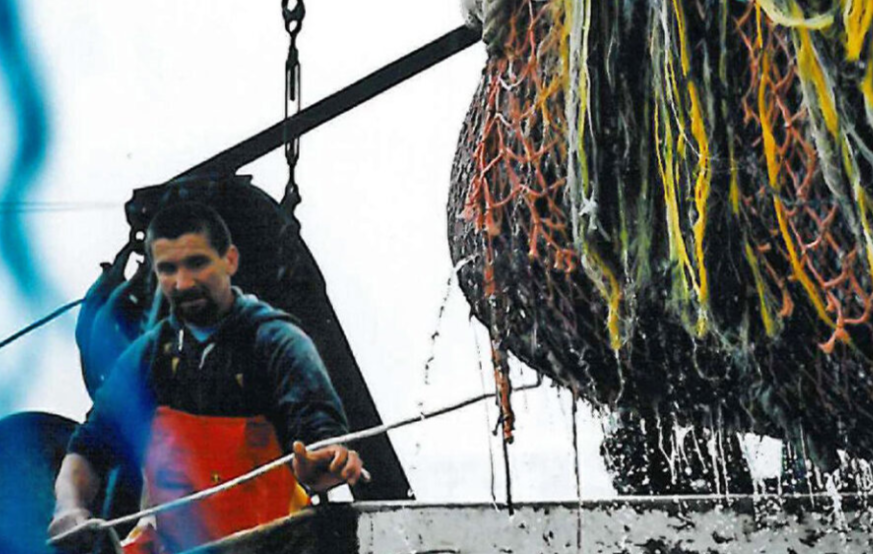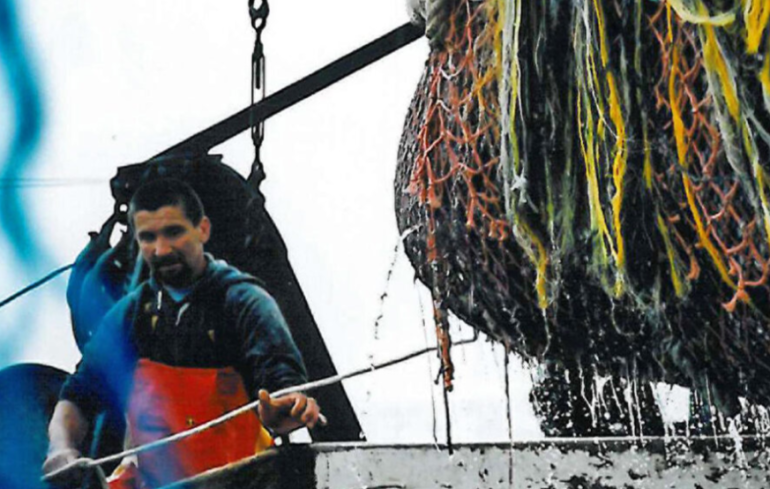Omanyano ovanhu koikundaneki yomalungula kashili paveta, Commisiner Sakaria takunghilile
Veronika Haulenga
Omanyano ovanhu koikundaneki yomalungula kashili paveta, Commisiner Sakaria takunghilile
Veronika Haulenga
Listeners:
Top listeners:
-
play_arrow
Omanyano ovanhu koikundaneki yomalungula kashili paveta, Commisiner Sakaria takunghilile Veronika Haulenga
Stalemate: WTO talks again fail to end overfishing subsidies


A crewmember working the net on a research trawl vessel. Image by Jennifer Gilden/Pacific Fishery Management Council via Flickr (CC BY-SA 2.0 Deed).
By Elizabeth Fitt via Mongabay
Ambitions to finalize a two-part treaty to equitably stop governments from funding overfishing were dashed again at the World Trade Organization’s 13th ministerial conference in Abu Dhabi, which ended in the early hours of March 2.
“This outcome is not just disappointing; it’s a dire blow to global marine biodiversity,” Daniel Skerritt, a senior analyst at U.S.-based conservation NGO Oceana, said in a statement. “The WTO’s continued failure to prohibit subsidy-driven overcapacity and overfishing jeopardizes the lives of millions of people who depend on healthy fish populations for their livelihoods and food security.”
Governments around the world pump an estimated $22 billion annually into so-called “harmful” fisheries subsidies, blamed for depletion of global fish stocks and distorted market dynamics. WTO member states have been trying to negotiate a deal to end them for 22 years.
The WTO’s 12th ministerial conference, MC12, in June 2022 finally brought a partial result. Delegates hustled a truncated deal, dubbed Fish One, over the line at the last minute, but only by putting off crucial aspects for resolution at this year’s meeting, MC13. Delegates to MC13 worked hard to do that, but agreement on Fish Two remained out of reach despite a 36-hour extension of the meeting.
“We came so close, but at the end of the day the one or two matters we could not bridge need more consultation … more thought, more engagement,” Ngozi Okonjo-Iweala, the WTO’s director-general, said in her closing statement.
“It makes me wonder if the WTO is ever going to be able to deliver an agreement that would remove overfishing subsidies,” Rashid Sumaila, a specialist in fisheries economics at the University of British Columbia, Canada, and an expert speaker on panels at MC13, told Mongabay. Without one, he said, sustainable fisheries aren’t possible: “It is like giving with one hand by trying to manage sustainably and taking with the other hand by providing overfishing subsidies.”
Ten states stepped up to ratify Fish One during MC13, bringing the total to 71 — still 39 states shy of what’s needed to start implementing it.
There were other notable developments at the meeting, where negotiators tried to tackle a gamut of global trade issues, including agricultural trade, e-commerce and intellectual property rights related to the COVID-19 pandemic. Delegates discussed sustainable development as a standalone topic for the first time, following recognition at MC12 of the importance of the multilateral trading system in achieving the U.N.’s Sustainable Development Goals (SDGs) by 2030. The WTO also welcomed its first new member states in eight years — Comoros and Timor-Leste — bringing the total to 166. And members adopted a declaration to reform the WTO, following concerns it isn’t responding effectively to the challenges it faces.
 A scene from the closing ceremony of the World Trade Organization’s 13th Ministerial Conference in Abu Dhabi on March 1. Image ©WTO/Prime Vision via Flickr (CC BY-SA 2.0 Deed).
A scene from the closing ceremony of the World Trade Organization’s 13th Ministerial Conference in Abu Dhabi on March 1. Image ©WTO/Prime Vision via Flickr (CC BY-SA 2.0 Deed).
The subsidies story so far
Consensus agreements require everyone’s buy-in, and convincing 166 countries to all pull in the same direction was never likely to be easy.
The WTO’s 2022 Fish One agreement is therefore “a key achievement,” Tristan Irschlinger, a policy adviser on fisheries subsidies at the Canada-headquartered International Institute for Sustainable Development think tank, told Mongabay, “but it only addresses certain situations where the impact of subsidies is the most unequivocally alarming: when fishing is illegal, when fish stocks are already depleted, and when fishing occurs in completely unregulated high seas fisheries.”
Issues that delegates to MC12 left for MC13 to hash out included how to stop subsidies from contributing to overfishing in the first place, and how to fulfill the SDG 14.6 requirement that special treatment for developing nations be written into the deal.
However, rules on subsidies that support distant-water fishing (DWF), where fleets operate in waters beyond their state’s jurisdiction; the parameters of special treatment for developing nations; and how to review the impact of the rules in the future remained intractable at MC13.
“The main outstanding issues are hard to resolve because of short-term non-cooperative thinking and behavior,” Sumaila said, adding that states were defending their own immediate economic interests rather than cooperating for a better future.
Contentious loopholes remain
The Fish Two negotiating text includes a list of costs member states have agreed in principle not to subsidize: building, buying, maintaining and upgrading fishing vessels; buying fish-finding technology or fishing, storage, sorting and cleaning gear; fuel, ice and bait; personnel costs and insurance; market price top-ups on fish sales; at-sea support and operating losses.
It also includes a clause that says states can actually subsidize anything on the list when fishing in their own waters, provided they demonstrate measures have been taken to maintain “relevant fish stocks” at biologically sustainable levels. A footnote specifies that members will self-determine what is biologically sustainable
“It is well-known that self-policing, and therefore self-determining, what constitutes ‘biologically sustainable’ does not work because you just need a small percentage of the population concerned to abuse the system for it to collapse,” Sumaila said.
The biologically sustainable levels exemption was extended to cover subsidies that support fishing in distant waters too, during MC13, and the wording of the DWF clause was watered down from “No Member shall grant or maintain subsidies …” to “Members shall refrain, to the greatest extent possible from granting or maintaining subsidies …”. This new language strips the DWF clause “of any vestige of a serious deliverable,” Ranja Sengupta, a senior researcher and coordinator of the trade program of the Third World Network, a Malaysian NGO, who attended MC13, told Mongabay.
The draft text is “much, much better than nothing” Irschlinger said. Fish stocks in areas where no credible fisheries management measures are in place would still benefit from prohibition of risky subsidies. And, he said, the silver lining to the exemption allowing subsidies when fish stocks are maintained at sustainable levels is that the data required will shed new light
 School of sardines in the Philippines. Image by Henry Jager via Flickr (CC BY-NC-ND 2.0 Deed).
School of sardines in the Philippines. Image by Henry Jager via Flickr (CC BY-NC-ND 2.0 Deed).
Fairness in the MC13 draft text
The Fish Two draft text sets out an exemptions framework giving special consideration to developing states. This ostensibly aims to promote a more equitable market by giving less-developed nations, historically unable to afford large subsidies, a chance to catch up to the well-established industry infrastructure that more-developed nations have already built by subsidizing investments. The text also maintains developing states’ subsidies to artisanal fishers who depend on them for their livelihoods, and gives as-yet undecided transition periods during which these states can continue to subsidize.
But some member states, fisheries experts and conservationists said the text arrived at during MC13 is still unfair. Inequity is hard-baked into it, favoring those already subsidizing heavily, with provisions for developing, limited-subsidy states amounting to lip service, they said.
Unless there is a rewrite of some key provisions in the draft, Sengupta said, this will be just another agreement “where big players keep their subsidies, and small players lose theirs.”
One requirement for developing nations, to stay below 0.8% of global catch share to qualify for exemptions, is effectively a catch-22: In order to have a chance of growing their fisheries sectors to ensure food security and livelihoods, they would get some special consideration — “but if they actually dare to grow bigger, they will be punished,” Sengupta said.
Additionally, assessing and monitoring fish stocks to prove biological sustainability is expensive, and only developed states will be able to afford to continue to subsidize under that provision of the text; developing nations will be financially locked out, Sengupta said.
What’s next?
WTO working groups will continue to grapple with the Fish Two draft text until member states take another stab at clinching a deal at MC14 in Cameroon in 2026.
We do need a treaty fast, given the state of marine resources, but only if it’s effective and targets the countries responsible for overfishing, Sengupta said: “It is more important to get it right than to get it quickly.”
For his part, Sumaila said the longer we take, the closer we get to destroying fish stocks and the more that will cost us. “Unlike people, who can negotiate with themselves forever, we can’t negotiate with nature forever,” he said.
To read the original article click here.
Written by: Contributed
Commercial Fishing distant-water fishing Fish One agreement fishing MC12 MC13 World Trade Organisation WTO
Similar posts
Government ministries should prioritise and support local enterprises
(Contributed Photo) PRIORTISE LOCAL ENTERPRISES: Works and Transport Minister Veikko Nekundi said government ministries should prioritise and support local enterprises, particularly manufacturers. He gave an example that, although there are local companies that manufacture toilet paper, some government entities still place orders from outside the country. Nekundi said that in […]
Windhoek Weather
Most popular

Mbumba signs off new benefits for retired political office bearers

Former FNB employee arrested after defraud pensioner off N$215, 000

Namdia Heist: More questions, lots of confusion

Omuhwahwameki Michael okuunganeka oshikonga shoku patitha oostola dho Rani moshilongo ashihe.

Walvis Bay woman loses over N$777.000 to a fraudster
Copyright 2025 Future Media (Pty) Ltd | Website by Digital Platforms
Tel: +264 83 000 1000 | Email: news@futuremedia.com.na




